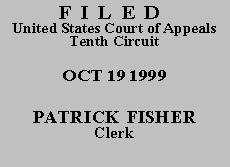

| In re: JESSE DOYLE BLAGG;
LEASA DAWN BLAGG,
Debtors.
, JESSE DOYLE BLAGG; LEASA DAWN BLAGG; TY H. STITES, Appellants, v. GERALD R. MILLER, Appellee. |
(BAP Nos. NO-97-092 & NO-98-006)
|
Through their attorney, Ty Stites, debtors in this bankruptcy case filed their chapter seven petition in the Northern District of Oklahoma, alleging that venue was proper in that district because the husband/debtor was employed there. The bankruptcy court granted the trustee's motion to dismiss for improper venue, sanctioned Mr. Stites $500 for misrepresenting the law to the court, ordered him to refile in the proper district and prosecute the case without further cost to debtors, and further ordered him to pay the trustee's reasonable fees and expenses. Without affording Mr. Stites the opportunity to be heard on this latter matter, the bankruptcy court eventually ordered him to pay the trustee $735.00 in fees and $42.40 in expenses.
The debtors and Mr. Stites appealed all of these rulings to the Bankruptcy Appellate Panel. That court affirmed both the dismissal of the case for improper venue and the imposition of sanctions. It remanded, however, to allow Mr. Stites to address issues surrounding the order to pay fees and expenses incurred by the trustee. The debtors and Mr. Stites then appealed to this court.
On October 29, 1998, the trustee filed a motion to dismiss the appeal for lack of jurisdiction which we now grant. We conclude that the BAP order is not final, and that we are therefore without jurisdiction to hear this appeal.
As mentioned above, the BAP remanded this case to the bankruptcy court for further inquiry into the reasonableness of the trustee's fee and cost request. "[A] decision of the [BAP] on appeal from a bankruptcy judge's final order is not itself final if the decision remands the case to the bankruptcy judge for significant further proceedings." Homa Ltd. v. Stone (In re Commercial Contractors, Inc.), 771 F.2d 1373, 1375 (10th Cir. 1985) (quotation omitted).(1)
[T]wo general principles regarding finality [are] well-settled in this circuit, i.e., (1) an order is not final unless it ends the litigation on the merits, leaving nothing for the court to do but execute the judgment and (2) a district court order is not final if it contemplates significant further proceedings in the bankruptcy court.
Cascade Energy & Metals Corp. v. Banks (In re Cascade Energy & Metals Corp.), 956 F.2d 935, 938 n.2 (10th Cir. 1992) (citations omitted).
Here, the BAP, in examining the fee/cost sanction noted:
The plain language of Rule 9011 requires that the court independently analyze the reasonableness of the requested fees and expenses. White [v. General Motors Corp., 908 F.2d 675, 684 (10th Cir. 1990)]. We note that the Trustee never requested nor obtained approval of his employment as attorney for the Trustee as required by 11 U.S.C. § 327(a). We further question whether the actions taken by the Trustee in filing the motions to transfer and dismiss required the services of an attorney, or whether they could have been performed in his capacity as trustee of the estate. Finally, we note that Stites was not given the opportunity to respond to the attorney fee request prior to the court's approval. Because Debtors did not have the opportunity to address these issues, we find it appropriate to remand the matter and direct the bankruptcy court to reexamine the Trustee's fee request after permitting Stites to respond in writing to the reasonableness of the requested fees.
Appellants' Opening Br., Tab 7 at 16-17.
We conclude that this BAP remand order requires the bankruptcy court to engage in "significant further proceedings" and is, therefore, not final for purposes of appellate review. Where an order of the BAP "requires the bankruptcy court to perform more than a mere ministerial duty, or if it involves the exercise of considerable judicial discretion," that order will not be considered final. Matsunaga v. Stoltenberg (In re Rex Montis Silver Co.), 87 F.3d 435, 438 (10th Cir. 1996) (quotation omitted) (holding that order imposing sanctions but failing to consider expressly the White factors in determining amount of sanctions was not final).
APPEAL DISMISSED.
Entered for the Court
Circuit Judge
*. This order and judgment is not binding precedent, except under the doctrines of law of the case, res judicata, and collateral estoppel. The court generally disfavors the citation of orders and judgments; nevertheless, an order and judgment may be cited under the terms and conditions of 10th Cir. R. 36.3.
1. "Although one holding of the court in Commercial Contractors was undercut by the Supreme Court in Connecticut National Bank v. Germain, 503 U.S. 249 . . . (1992), this court has held that Commercial Contractors 'continues to provide the test for the finality of district court decisions in bankruptcy proceedings.' Temex Energy, Inc. v. Underwood, Wilson, Berry, Stein & Johnson, 968 F.2d 1003, 1005 (10th Cir. 1992)." Matsunaga v. Stoltenberg (In re Rex Montis Silver Co., 87 F.3d 435, 438 (10th Cir. 1996).